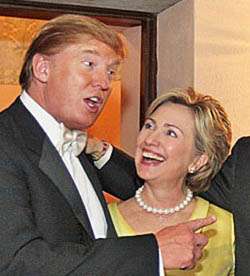Why Are We Expecting the Next President To Fix the Economy?
We should be demanding only that they don't keep screwing it up.

Donald Trump and Hillary Clinton both won big last night in New York's presidential primaries. They might not have all that much in common but their supporters do. Fully 92 percent of Republican voters said they were "worried about the economy," while 87 percent of Democrats agreed.
According to CNN exit polls, fully 36 percent of GOP voters said "the economy" was their top issue. After that came "government spending" at 28 percent and "terrorism" at 23 percent. Immigration was a distant fourth, with just 9 percent of Republicans citing it as their top concern. Even among Trump voters specifically, immigration did not rate highly, with most saying they worried about terrorism (63 percent), government spending (57 percent), and the economy (54 percent).
CNN didn't ask exactly the same questions of Democratic voters but when it came to top issues, "economy/jobs" topped the list of concerns at 38 percent, followed by income inequality (26 percent), health care (18 percent), and terrorism (15 percent). For Clinton voters, the breakdown was terrorism (68 percent), health care (62 percent), economy/jobs (61 percent), and income inequality (44 percent).
While it's understandable that concerns that are either directly or indirectly related to the economy dominate voters' minds, it's far less clear what presidential candidates can promise that will energize the economy in any sort of quick fashion. We know, for instance, that Barack Obama's much-touted stimulus plan back in 2009 failed to hit its targets (and we know that George Bush's 2008 tax-stimulus accomplished nothing other than driving up national debt a bit more). For all of his businessman bravura, Trump's economic pronouncements revolve mostly around squeezing more coin out of trade partners, rather than actually increasing economic activity. Clinton is even worse on this score, pushing for a continuation of Obama's policies and jacking up spending on various programs that don't even qualify as make-work operations. Like all the canddidates, Trump and Clinton have tax plans that will, their adherents claim, goose economic activity like a noseful of methamphetamine. We should all be skeptical.
If the Obama years—and the Bush years before them—should have taught us anything, it's that government activity is far less more likely to dampen or undercut economic activity than embolden it. The long, still-ongoing slog against mandatory health insurance infused an already shaky economy with massive amounts of uncertainty. How much was any of this really going to cost employers? That's still a question that hasn't been answered very well, but it can't be helping the job market. Toss on top of that major regulations emanating from Dodd-Frank (again, not yet fully implemented). And before that, all the mega regs and activities of the Bush years (Sarbanes-Oxley, whose onerous accounting rules are credited with sending IPOs to London and elswhere; dumb war after dumb war; and more). In the 21st century alone, we've lived through two big recessions and two slow-moving, "jobless recoveries" where unemployment scrapes 4 percent or 5 percent while nobody feels like they're getting ahead. Maybe we're just jaded after decades of 3 percent annual economic growth. Or maybe the difference between us being happy and angry resides in that 1 percentage point between 2 and 3.
Here's something that politicians, especially those running for president, might do that would help our long-term economic prospects: restrain government spending. Nobody is really talking anymore about the correlation between national debt and long-term economic growth. That's probably because even the critics of "debt overhang" theorists Carmen Reinhart, Kenneth Rogoff, and Vincent Reinhart agree that high debt loads (such as those seen in Japan and other advanced economies) and low or nonexistent growth rates go together like the Titanic and icebergs.
If voters in New York are at all representative (hmm, let's ask Ted Cruz), we are at least interersted in questions about government spending. High level of debt, goes the theory, spook economies because people know that at some point the gravy train is going to run off the track and taxpayers will see benefit cuts, tax increases, or, most likely, a combination of both. So how about a presidential debate or town hall or iron-cage match in which the candidates tell us fewer fairy tales about how they will light a fire under the economy by giving their constituents more money and inform us about how they will stop throwing blankets on our economic activity and will deal with something they can control: How much the government spends this year and the next and the one(s) after that?


Show Comments (66)